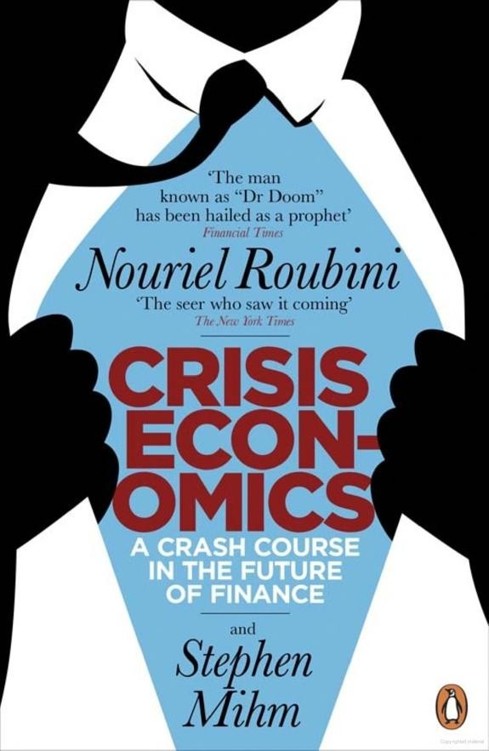
Crisis Economics
A Crash Course in the Future of Finance
کتاب های مرتبط
- اطلاعات
- نقد و بررسی
- دیدگاه کاربران
نقد و بررسی

June 21, 2010
Roubini (Bailouts or Bail-ins), a professor of economics at NYU, was greeted with skepticism when he warned a 2006 meeting of the IMF that a deep recession was imminent. Along with economics historian Mihm, (A Nation of Counterfeiters) Roubini provides an in-depth analysis of the role of crises in capitalist economies from a historical perspective. With thumbnail sketches of nineteenth and twentieth century economic thought from Smith, Keynes, and others, they provide a context for understanding financial markets and the ways in which bankers and politicians relate to them. The authors also offer a theoretical context for understanding the current economic crisis and for using it as "an object lesson... , prevent them, weather them, and clean up after them." Dismissing the "quaint beliefs" that markets are "self-regulating," they take issue with the simplistic populist assumption that the present crisis was caused by greed or something "as inconsequential as subprime mortgages." They blame Alan Greenspan's refusal to use the power of the Fed to dampen unbridled speculation, choosing instead to pump "vast quantities of easy money into the economy and it there for too long." This will be a useful guide for readers attempting to get a handle on the present crisis.

April 15, 2010
Two professors explain how we got into the current economic mess and offer a prescription for the way out.
Roubini (Economics/New York Univ.; co-author, New International Financial Architecture, 2006, etc.) and Mihm (History/Univ. of Georgia; A Nation of Counterfeiters: Capitalists, Con Men, and the Making of the United States, 2007, etc.) define crisis economics as"the study of how and why markets fail." The origins of the current upheaval, they contend, are deeply structural—far more severe than simply a housing bubble and the securitization of bad loans—and the storms will persist. They preface their proposed remedies with a whirlwind tour of past crises, a survey of economic thinkers who offer insights into why markets collapse, an analysis of how today's unstable moment compares with past market traumas and a look at the special dangers posed by our integrated global economy. Critiquing the unprecedented emergency measures taken recently to right the economic ship, they warn of the unintended consequences likely to flow from hasty decisions made under extreme pressure. We should use this moment of relative calm, they argue, to institute necessary changes. These range from the fundamental—reform of Wall Street's compensation system, the securitization process and private ratings agencies, and a crackdown on derivatives and bank supervision—to the radical—thoroughly rethinking the nature and composition of regulatory agencies, tackling the problem of financial institutions currently deemed"too big to fail" and using the government's tools to discourage predictable and disastrous economic bubbles. Notwithstanding their argument's scholarly scaffolding, Roubini and Mihm manage a smooth translation of the dismal science. Their challenging yet accessible narrative will reward general readers, many of whom are stunned by recent developments and suddenly seized with questions about how our economy works—and doesn't.
An impressive, timely argument on behalf of transparency and stability for a financial system conspicuously lacking both.
(COPYRIGHT (2010) KIRKUS REVIEWS/NIELSEN BUSINESS MEDIA, INC. ALL RIGHTS RESERVED.)

July 1, 2010
Roubini (economics, New York Univ.), who famously anticipated the 2007–09 financial crisis, has worked quickly to produce a textual autopsy, prelude, and discussion of the consequences. In collaboration with Mihm (history, Univ. of Georgia), Roubini explains the role of ratings agencies, shadow-banking institutions, legislators, regulators, and foreign and domestic investors leading up to the financial crisis. The authors illuminate the murky subject of derivatives, which helped bring the finance world to its knees, although at times their explanations seem long and redundant. The strength of the book is in depicting the crisis as not an anomaly but rather one of many historical financial crises sharing similar origins and resolutions. The authors are most lucid in the chapters discussing history and outlook, and Roubini's forecasting notoriety adds weight to the predictions and remedies proposed. VERDICTThose looking for a simple explanation of the financial crisis should pass on this book, but readers interested in details will learn a great deal about not only how the crisis formed but also how the financial system should be developed and global financial stability enhanced going forward.—Jekabs Bikis, Dallas Baptist Univ.
Copyright 2010 Library Journal, LLC Used with permission.

























دیدگاه کاربران